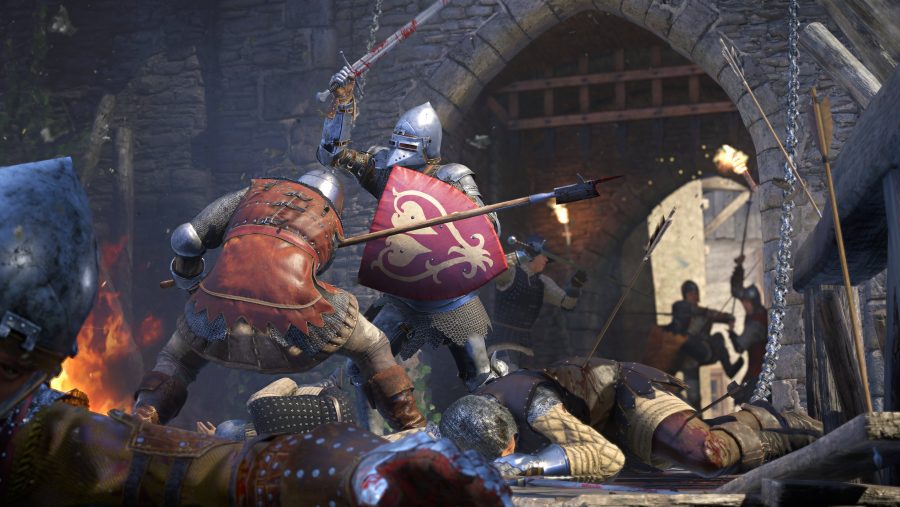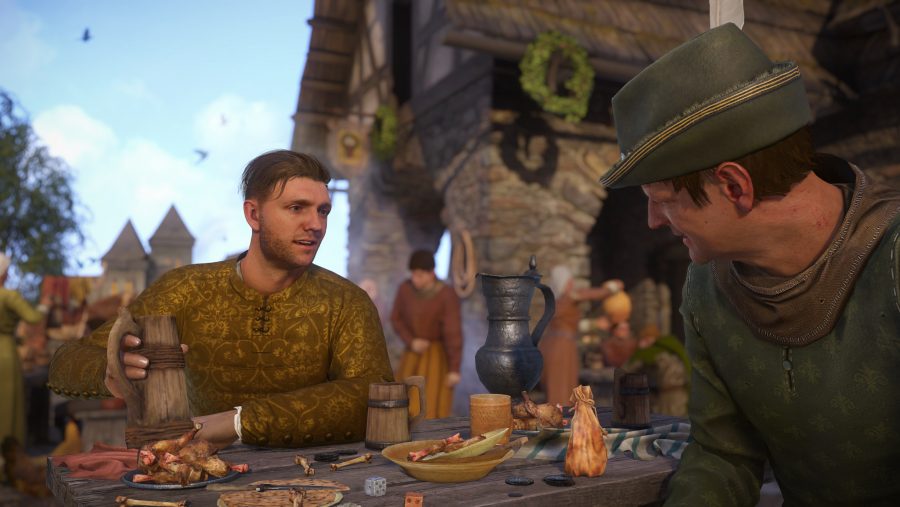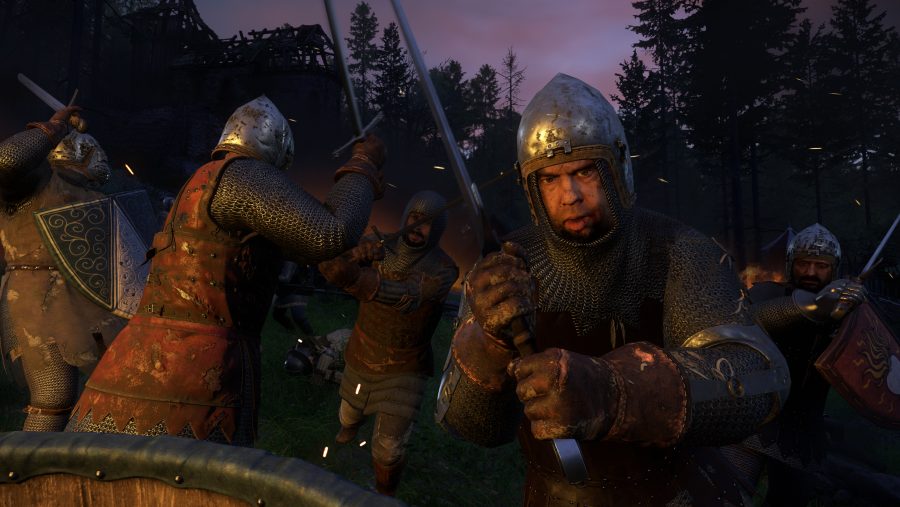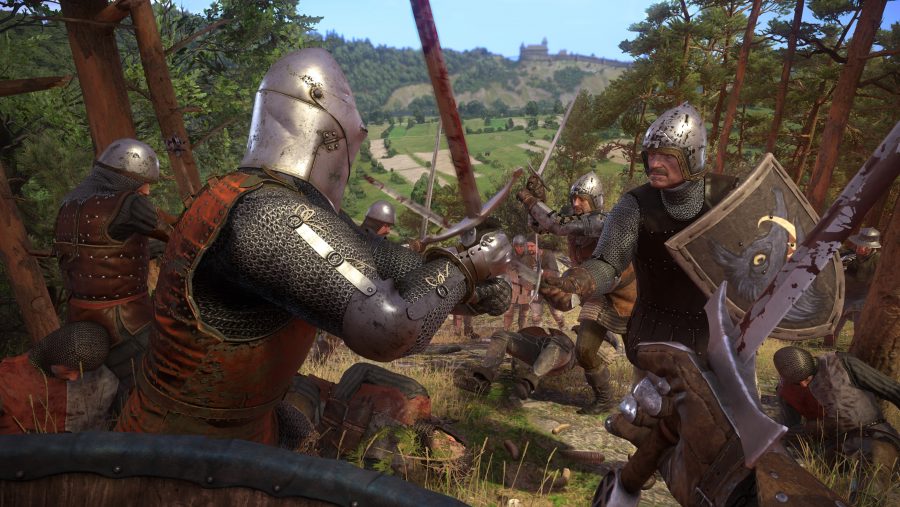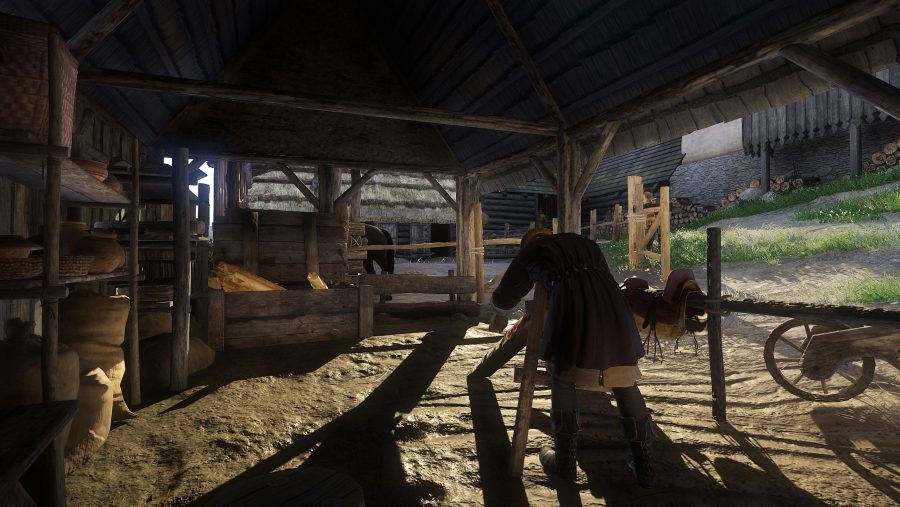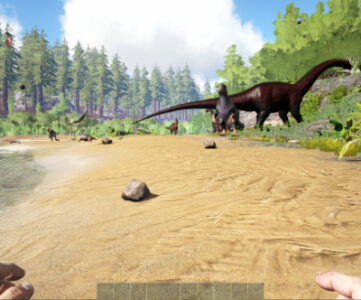[ad_1]
Our Verdict
As stubborn as it is embracing, making for a potentially tumultuous relationship between player and game. But it is a relationship you’ll absolutely feel compelled to nurture.
June 19, 2020 Kingdom Come Deliverance is free on Steam this weekend!
Kingdom Come: Deliverance is a mischievous sort. It lures you in with a first-person RPG framework that is instantly identifiable as ‘The Bethesda Style’, then quickly strips away all the comforts that we took for granted in those games, leaving us naked, starting afresh.
Quests often require in-depth detective work, combat encounters are terrifying, and the nights are so dark that without a torch you risk breaking your leg (and you can forget about quick loading to before the incident – unless you patch the game, that is). Even fast-travel is fraught with danger, as you are forced to watch your little pawn slide across the hand-drawn map, vulnerable to random encounters.
And, of course, there is no magic. This is Central Europe in the year of our Lord 1400ish; a place so religious that ‘God Be With You’ is the colloquial term for ‘Hello’. Start spouting off about spells and wizardry around these parts and you’ll be burned at the stake.
It’s a fascinating game to say the least – as maddening as it is, dare I say it, magical.
You are Henry, a blacksmith’s son in Bohemia. You have the misfortune to witness your parents’ murder, at the hands of a Cuman mercenary army that razes your home village at the behest of King Sigismund of Hungary. Fleeing the carnage to the nearby fort of Talmberg, Henry impresses the local Bohemian nobility with his bravery and boyish charms and begins to make a name for himself among them, steadily building up his skills and reputation in a bid to get his revenge.
It is a hearty tale, the writing clearly, in part, influenced by the global fascination with Game of Thrones, and its rejigging of our perception of old-time lexicon. Yes, it is foul-mouthed and sometimes crass, yet each line is delivered with enough subtlety to make both the nobles and peasants relatable. Henry is a good lad, neutral enough that you can play him as a golden boy or vagabond. Lords like Divish and Radzig exude wisdom and authority, while more lighthearted relationships – such as that between Henry and silver-spooned rich kid Hans Capon, or a debauched night out with a wayward priest – offer fine comic relief. Faces are a little dead-eyed and ventriloquist-mouthed, but more established developers have been guilty of worse.
Strike forth: The best RPG games on PC
Kingdom Come is heaving with intricate systems, each of which can take hours to grasp. You need to eat and sleep to survive, for example, but should you go foraging in the wild you will want to avoid eating any old mushrooms as food poisoning can be deadly. Likewise, do not overeat, lest your energy and reflexes take a hit. It sounds fussy, but after a few hours these nags are not that noticeable – I even came to enjoy it.
Here’s a quick tip: early in the game, all the dead bodies on your return to Henry’s home village have pretzels on them. You may judge me now, but you’ll thank me later.
When your supply of corpse-pretzels runs dry, you can hunt for food in the wild. With no crosshair for guidance, and the amount of time you can keep your bow taut limited by stamina, it will feel like a glorious, life-saving achievement when you kill your first hare. You hunt here to survive and not necessarily to replenish your health.
Meanwhile, manual skills like pickpocketing, lockpicking, and weapon-honing are probably about as close as games have come to replicating the real thing. To sharpen your blade, for instance, you need to lower it to the spinning grindstone at the perfect angle, with flying sparks denoting that you are doing a good job (remember to keep rhythmically tapping the button to keep the grindstone turning). It feels great. Lockpicking, on the other hand, is borderline broken on a gamepad but passable on mouse and keyboard. Every time you utilise a skill, you are not only levelling up Henry in that ability, but improving your own technique in tandem.
But the success of these simulation elements is not consistent and the game would benefit from some of them being more forgiving, if only a little. For example, to save your progress you need to either find a bed to sleep in, wait for an auto-save during a mission, or buy a pricey ‘Saviour Schnapps’. You will be fine if you stick to the main story, but that’s not exactly getting into the spirit of an open-world game, is it?
For one particularly fetchy side-quest, I had to go to a town to pick up a horse, serenade it (don’t ask), then ride it back to the quest-giver’s town. The other parts of the quest were in distant areas of the map, so I cracked on with some other activities; among which was a treasure hunt using a scribbled map I bought off a beggar. An hour of bimbling about later, some iffy swordsmanship, and I am dead – rewound to the start of the side-quest. The first time I played, I got an hour into the prologue before getting locked up in a dungeon, burned to death, and having to restart the entire game.
Melee combat is the most ambitious system of the lot, and viciously hard to master. You target specific zones on your enemy’s body, and need perfect timing to string combos together. All the while, you will need to watch your stamina bar, which can be quickly drained by a kick to your gut or a few swings at your shield.
It works well enough in duels, giving each encounter such gravitas that avoiding combat altogether often feels like the best course of action (thankfully, stealth and speechcraft are viable alternatives). There are moments of satisfying flow, when you outwit your enemy by targeting the soft armour on their leg, before dummying a left swing and going high for the head. It claims to be realistic – I don’t intend to questioning those sword stances – but it does lack some immediacy. Hitting an enemy feels spongy, the hitboxes are unclear, and encounters can feel protracted without any chance of a sudden, bloody finish. Sometimes I wish I could counter my foe and drive my sword through him, or one-shot him with a macey haymaker to his unarmoured bonce.
Then there are the large-scale encounters where combat descends into a fiddly, unreactive nightmare. Switching between enemies is awkward, and your attacks don’t adapt to uneven terrain, so forget about killing someone a couple of steps lower than you. Combine that with sticky world geometry where you can get wedged on small ledges, steps, and shrubs, and it can all get a bit stiff and sclerotic.
Mixed in amid this daunting simulation is an RPG that offers enough freedom to make combat largely avoidable. As you level up, you unlock cheeky, irreverent perks. Some are trade-offs – such as ‘Brute’, which improves your strength while lowering your speech – while others unlock combos for your weapon, or make you better at charming nobles. Small matters like hygiene and how snappily you are dressed also affect people’s attitude towards you. Likewise, pulling out a bloodied sword might make a potential assailant think twice. It all makes for wholesome roleplaying, forcing you to really consider what kind of character you want to be. The ‘Jack of All Trades’ route that Bethesda’s RPGs often allow for is not viable here.
Speaking of big decisions, quests are an eclectic bag in Kingdom Come, ranging from tedious fetch requests to captivating detective work. If you are investigating a crime, for instance, you rarely have pointers telling you exactly where to go, and must ask around in a large, designated area. At one point, I tracked a perp by following his bloodstains into the forest, then simply had to listen out for signs of him. In today’s RPG landscape of sat-nav maps, complete with arrows that show you the quickest route to your destination, Kingdom Come’s approach is refreshing in its insistence that you get your hands dirty.
You can become a prizefighter, trip out with ‘witches’, and take part in sizeablebattles – there are plenty of big, memorable, and surprising quests to embark on. But there is a charm to be found in the game’s less attention-grabbing quests, too. This isn’t a world designed to make you feel like a hero, so even going on patrol to clear beggars from the streets (or, indeed, choosing not to), or digging up a corpse for loot offers job satisfaction. Many of these quests are time-sensitive, too, so if you fail to pick up your date in the morning as agreed, or bail on Father Funtimes when he invites you for a drink to the pub in the evening (don’t bail, he’s a hoot), you risk locking yourself out of making further progress in a given questline. Kingdom Come is not forgiving of tardiness, and will let you mess up without so much as a notification to warn you, forcing you to live with your decisions and actions.
That cavalier approach to player failure allows freedom, sure, but it does not always work out. While Kingdom Come is a well-designed RPG, and it does often let you seek out alternative means to completing a mission, such lack of handholding isn’t alwaysthe case. You really feel that absence when it shows up. Developers Warhorse made a big deal of how dynamic the world of Kingdom Come is, with characters and events in the world going about their business irrespective of you. This works to a point: medieval folk do their jobs, eat meals at certain times of day, and even get changed for bed. But as is often the case in these types of games, such systemic behaviours collapse in comical fashion as soon as you begin to poke at them.
My first test of this was in the prologue, when I was tasked with retrieving a debt from a local drunk. With my three ruffian pals around the corner, I started to fight the target, then kited him over to them, assuming they would help me out. No such luck. They just stood there, staring vacantly ahead like passengers on the Tube, as if my disruption to their strict regimen was too awkward to address. Another time, a number of guards could muster no reaction to the sight of me standing over their unconscious colleague, squeezing into his clothes. A couple of days later, I see the guard I knocked out back on patrol, wearing nothing but his undergarments. Life went on as usual despite my attempts at disruption. Still, this has value in itself, being the kind of absurdist comedy that only games can pull off. But it makes the claims that Kingdom Come’s world is smart and reactive a little harder to accept.
Divorced of the idiocies of public life, however, Kingdom Come’s Bohemia is a beautiful place. Yes, you will have seen more dramatic and imaginative videogame scenery before, but I have never played a game that evokes actualnature as well as this. Distant hills undulate elegantly across the screen, forest floors are covered in bobbles of moss, and rich foliage leans into your vision from all angles. In towns, too, the attention to detail is sublime. The thatched houses of smaller towns are dark and cosy, while in more cosmopolitan areas you will find multi-storey buildings with gently dyed facades. Stepping into a little town church, meanwhile, where flickering candles saturate the rich textures of the murals with a divine glow, is so calming that I could feel my ancestors’ Catholicism reawakening in me.
Kingdom Come is equally as capable of frustrating you, however. When your oafish horse gets stuck in some foliage, or your sword crosshair flips out as you are getting kicked and shoved by some ruffians, it can make you want to bite down on your keyboard and scream.
But, for me at least, suffering such nuisances is worth it to spend more time in Bohemia. There is a verisimilitude here; a hand-crafted, historical sense of reality when I am trudging through the puddled streets of a town or getting lost in the woods. Then, beneath this – past the unforgiving simulation – is a rich RPG where the finest details and choices you make help mould your character.
[ad_1]

